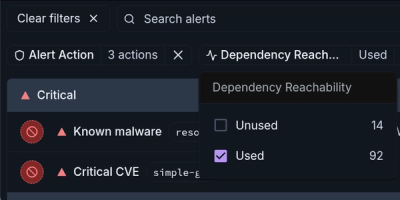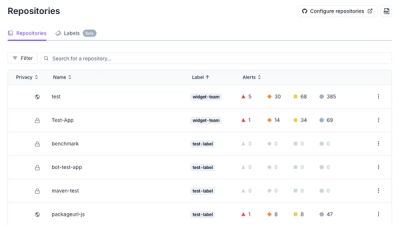
Product
Introducing Module Reachability: Focus on the Vulnerabilities That Matter
Module Reachability filters out unreachable CVEs so you can focus on vulnerabilities that actually matter to your application.
@codecov/nextjs-webpack-plugin
Advanced tools
A NextJS (Webpack) plugin that provides bundle analysis support for Codecov.
[!NOTE] The plugin does not support code coverage, see our docs to set up coverage today!
Using npm:
npm install @codecov/nextjs-webpack-plugin --save-dev
Using yarn:
yarn add @codecov/nextjs-webpack-plugin --dev
Using pnpm:
pnpm add @codecov/nextjs-webpack-plugin --save-dev
This configuration will automatically upload the bundle analysis to Codecov for public repositories. When an internal PR is created it will use the Codecov token set in your secrets, and if running from a forked PR, it will use the tokenless setting automatically. For setups not using GitHub Actions see the following example. For private repositories see the following example.
// next.config.mjs
import { codecovNextJSWebpackPlugin } from "@codecov/nextjs-webpack-plugin";
export default {
webpack: (config, options) => {
config.plugins.push(
codecovNextJSWebpackPlugin({
enableBundleAnalysis: true,
bundleName: "example-nextjs-webpack-bundle",
uploadToken: process.env.CODECOV_TOKEN,
gitService: "github",
webpack: options.webpack,
}),
);
return config;
},
};
This setup is for public repositories that are not using GitHub Actions, this configuration will automatically upload the bundle analysis to Codecov. You will need to configure the it similar to the GitHub Actions example, however you will need to provide a branch override, and ensure that it will pass the correct branch name, and with forks including the fork-owner i.e. fork-owner:branch.
// next.config.mjs
import { codecovNextJSWebpackPlugin } from "@codecov/nextjs-webpack-plugin";
export default {
webpack: (config, options) => {
config.plugins.push(
codecovNextJSWebpackPlugin({
enableBundleAnalysis: true,
bundleName: "example-nextjs-webpack-bundle",
uploadToken: process.env.CODECOV_TOKEN,
gitService: "github",
webpack: options.webpack,
uploadOverrides: {
branch: "<branch value>",
},
}),
);
return config;
},
};
This is the required way to use the plugin for private repositories. This configuration will automatically upload the bundle analysis to Codecov.
// next.config.mjs
import { codecovNextJSWebpackPlugin } from "@codecov/nextjs-webpack-plugin";
export default {
webpack: (config, options) => {
config.plugins.push(
codecovNextJSWebpackPlugin({
enableBundleAnalysis: true,
bundleName: "example-nextjs-webpack-bundle",
uploadToken: process.env.CODECOV_TOKEN,
webpack: options.webpack,
}),
);
return config;
},
};
For users with OpenID Connect (OIDC) enabled, setting the uploadToken is not necessary. You can use OIDC with the oidc configuration as following.
// next.config.mjs
import { codecovNextJSWebpackPlugin } from "@codecov/nextjs-webpack-plugin";
export default {
webpack: (config, options) => {
config.plugins.push(
codecovNextJSWebpackPlugin({
enableBundleAnalysis: true,
bundleName: "example-nextjs-webpack-bundle",
webpack: options.webpack,
oidc: {
useGitHubOIDC: true,
},
}),
);
return config;
},
};
FAQs
Official Codecov NextJS (Webpack) plugin
We found that @codecov/nextjs-webpack-plugin demonstrated a healthy version release cadence and project activity because the last version was released less than a year ago. It has 0 open source maintainers collaborating on the project.
Did you know?

Socket for GitHub automatically highlights issues in each pull request and monitors the health of all your open source dependencies. Discover the contents of your packages and block harmful activity before you install or update your dependencies.

Product
Module Reachability filters out unreachable CVEs so you can focus on vulnerabilities that actually matter to your application.

Company News
Socket is bringing best-in-class reachability analysis into the platform — cutting false positives, accelerating triage, and cementing our place as the leader in software supply chain security.

Product
Socket is introducing a new way to organize repositories and apply repository-specific security policies.